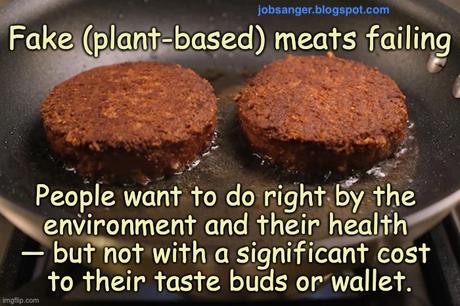
The following is part of an op-ed by Helaine Olen in The Washington Post:
The future of plant-based meat was supposed to be cooked to perfection. In recent years, corporate and venture capital funds poured into the space. Fast-foodgiants such as KFC and Burger King raced to roll out offerings. The meme stock crowd rallied around Beyond Meat. Sales were growing. It would appeal to vegans missing meat! Even better, it would find a following with meat-eaters looking to cut back!
It’s now clear that the hype got ahead of a sometimes less than tasty reality. Sales of plant-based meats in the United States are down by more than 10 percent from this time last year. The issue is basic: The problems fake meat were meant to solve — from the climate impact of industrial farming to the health impacts of meat — are all too real, but the solution it offers appeals to far fewer consumers than expected.
The truth, of course, is that we eat not simply for nutrition, but for enjoyment. Meat offers up a sinewy, gamy, savory experience that is, to date, impossible to reproduce.
When I asked around over a period of weeks, I discovered few fans of processed meat substitutes. “Too chewy,” one friend said. “Mushy,” said another. My older son made a face. The only person I could find who claimed it tasted like the real thing admitted, actually, she hadn’t tasted the real thing in more than 20 years. Some people with vegetarian-leaning diets told me they didn’t mind it and were happy to have it as an option on fast-food menus, and others told me that they enjoyed it as a substitute for breakfast meat like sausage and bacon. But few people seemed to find plant-based meat really delectable.
On the expert side, everyone from Wall Street short sellers to market researchers said that, at least for now, many fake meat sales appeared to be to people giving it a test drive. “I think a lot of the demand was people trying it once,” said noted short seller Jim Chanos, when I called him up to ask how once-promising Beyond Meat ended up as one of the most popular shorts out there. He pointed out the company is "unprofitable.” When I asked him what he himself thought of the offerings, he replied, “Put me in the category of people who tried it once.”
And when it came to health, yes, these “meats” cuts back significantly on saturated fat compared to the real thing — but they also contain more sodium. They’re a highly processed offering. “These are not your mother’s veggie burgers made with beans and other whole plant ingredients,” warns a report issued this year by the advocacy group Food & Water Watch. The industrial food complex is a huge player, with companies such as Tyson Foods and Cargill dominating the space.
Those facts mean that many people well-informed about health have remained skeptical about adding these artificial meats to their diets. “It has the same feel as much else in the industrial landscape, where we think we can outsmart nature,” says Kristin Lawless, the author of “Formerly Known As Food.”
The data shows the new offering doesn’t seem to result in major meat cutbacks — it’s more of a supermarket add-on. As a study published this year in the journal Nature dryly observed, “Interestingly, after a household’s first PBMA [plant-based meat alternatives] purchase, ground meat consumption did not fall.”
In a moment of rising food costs, such novelties become all too easy to dispense with. Of the people who told me they both enjoyed plant-based meat and dined on it regularly (often as a substitute for breakfast meats), several said they’d cut back when inflation kicked up. That points to a significant problem — artificial meat is often more expensivethan at least the budget version of the real thing.
In other words, people want to do right by the environment and their health — but not with a significant cost to their taste buds or wallet.

